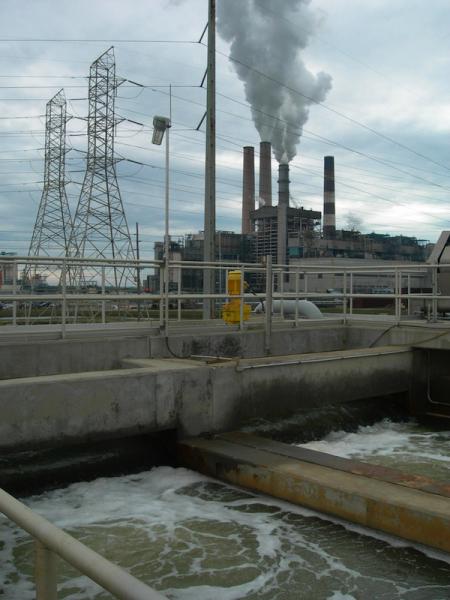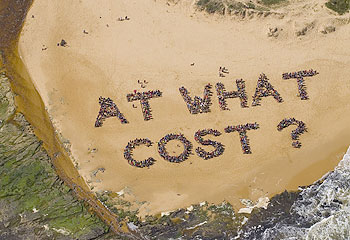 Many people in Southern California think that we are in a perpetual drought and will not have enough water to sustain ourselves. Unfortunately, this common fear is fueling misguided support for ocean desalination, the process of removing salt from seawater to create potable water.
Many people in Southern California think that we are in a perpetual drought and will not have enough water to sustain ourselves. Unfortunately, this common fear is fueling misguided support for ocean desalination, the process of removing salt from seawater to create potable water.
Our fresh water supply is often wasted and underutilized, especially when 60% percent of the water we produce goes towards landscaping purposes, not human sustenance. We need to use what we have wisely, and consider innovative, cost effective and environmentally friendly supply options.
There are currently 16 proposed desalination plants in California, and the idea is spreading. Desalination is the most environmentally damaging, energy intensive and expensive water supply option. In Huntington Beach, Poseidon Resources, a Connecticut-based corporation, plans to privatize a public good, and use outdated technologies to make a profit at the expense of ocean ecosystems and ratepayers wallets. Poseidon has never successfully built a large desalination plant before; they have only demonstrated that they are good at making closed-door deals.
Poseidon plans to use open ocean intake pipes, which the State of California has required all coastal power plants to discontinue using by 2020. Open ocean intakes suck in and kill billions of fish eggs, adult fish and other marine life. Not only is desalination harmful when taking water in, but also when it expels hyper saline brine, the salt by-product of the desalination process. In addition to a very high concentration of salt, brine also contains other pollutants such as heavy metals that can bioaccumulate throughout the food chain.
According to a study by the Pacific Institute, “direct discharges into estuaries and the ocean disrupt natural salinity balances and cause environmental damage of sensitive marshes or fisheries.” The brine discharge from the Poseidon plant will cause a dead zone off the coast of Huntington Beach. (For more information on opposition to the Poseidon plan, go to nowaterdeal.com.
Desalination not only harms marine resources, but it also affects our climate through increased greenhouse gas (GHG) emissions. Desalination is the most energy intensive water supply option. The Poseidon Huntington Beach plant would use enough energy to power 30,000 homes. Twenty percent of California’s cumulative energy demand goes to moving and treating water.
In a 2008 report, the California Air Resources Board noted that a way for the state to reach its reduced GHG goals is to replace existing water supply and treatment processes with more energy efficient alternatives. Desalination is a step in the wrong direction if we want to reach this goal.
A recently approved Poseidon desalination plant in Carlsbad was originally estimated to cost around $250 million; now it is nearly a $1 billion project. The water to be produced at the plant costs 4 to 8 times more than other water sources such as groundwater or recycled water. And rate payers are bound to a 30- year contract to buy the water.
Desalination may be one of the tools that water agencies and the public choose to pursue in the future but not before fully exploring and adopting the less expensive and proven options such as promoting water use efficiency, or funding the expanded use of recycling systems such as the Ground Water Replenishment System in Fountain Valley. The system takes highly treated wastewater that would have been discharged into the ocean and purifies it at a very affordable rate. In fact, the cost of water, per acre-foot, produced at the replenishment system costs one-third of what distributed water produced from a desalination plant would cost.
 Capturing urban runoff from the many high volume creeks and streams throughout the region, which dump hundreds of millions of gallons of polluted water a day into the ocean, is a viable and cost-effective alternative. Richard Atwater, Executive Director of the Southern California Water Committee recently stated that Southern California needs to “recognize the importance and potential of stormwater as a supplemental water supply source to what we currently import”. Much of this water should be captured and recycled to provide indirect potable water and reduce pollution to our ocean, which is required by law anyway.
Capturing urban runoff from the many high volume creeks and streams throughout the region, which dump hundreds of millions of gallons of polluted water a day into the ocean, is a viable and cost-effective alternative. Richard Atwater, Executive Director of the Southern California Water Committee recently stated that Southern California needs to “recognize the importance and potential of stormwater as a supplemental water supply source to what we currently import”. Much of this water should be captured and recycled to provide indirect potable water and reduce pollution to our ocean, which is required by law anyway.
Another flaw of building a desalination plant in Huntington Beach is that the Orange County Sanitation District releases millions of gallons of secondary treated water a day into the ocean less than a mile from the site for the desalination plant. Why treat wastewater, release it into the ocean, then spend $1 billion to build a plant that sucks that same water back in just to take the salt out of it? The water coming out of the sanitation district’s facility is already being treated at a level that it could be used as an indirect potable water source to expand the Ground Water Replenishment System.
Water reuse can help better utilize our current water supply, but we can also implement more conservation measures on the demand side. A cost-effective example is the move some cities are making to stop using potable water for landscaping. Reclaimed water is clean and safe enough to be utilized for irrigation. With the elimination of overwatering and the use of modern landscaping featuring California Friendly vegetation, we can drastically reduce the amount of water needed for landscaping and use the saved water for people and industry. The resulting water savings would help protect our current water supply, save ratepayers money, and reduce the need to create, or import more water.
The Sierra Club realizes that desalination is a necessary option for the future, in regions that have exhausted all other options. What we are opposed to is using destructive 1960s technology that destroys our fish stocks and pollutes our ocean. Other countries have implemented desalination as a last resort when all other options have been tried. Hopefully California will do the same.
The Poseidon Huntington Beach project will be the turning point on desalination is done in California and your help is needed. Watch for messages from the Sierra Club Angeles Chapter regarding opportunities to send in letters or attend meetings to stop Poseidon and protect our environment.
Ray Hiemstra is the Orange County Conservation Committee Chair for the Angeles Chapter Sierra Club.
Top photo: A desalination plant in Tampa Bay, Fla.
Related content:
Zachary Crosner
November 27, 2013, 4:55 pm
Terri
May 1, 2014, 10:51 am
Jack Spallino
April 3, 2013, 10:39 am